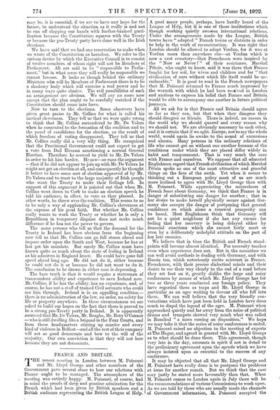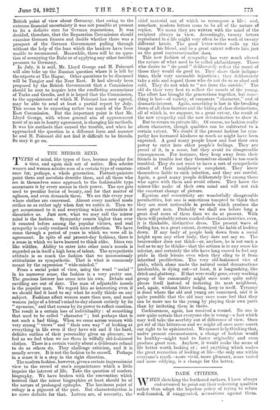FRANCE AND BRITAIN.
(SHE recent meeting in London between M. Poincare 1 and Mr. Lloyd George and other members of the Government gave several clues to how our relations with Prance ought to be managed. The atmosphere of the meeting was entirely happy. M. Poincare, of course, had in mind the proofs of deep and genuine admiration for the French which had been given by British speakers and a British audience representing the British League of Help. A good many people, perhaps, have hardly heard of the League of Help, but it is one of those institutions which though working quietly sweeten international relations. Under the arrangements made by the League, British towns have " adopted " French towns or districts in order to help in the work of reconstruction. It was right that London should be allowed to adopt Verdun, for it was at Verdun more than anywhere else—at Verdun which is now a vast cemetery—that Frenchmen were inspired by the " Now or Never ! " of their resistance. Marshal Petain, who ought to know, said it was there that France fought for her soil, for wives and children and for "that civilization of ours without which life itself would be un- endurable." It is good to read in the French newspapers that M. Poincare returned to France much impressed by the warmth with which he had been received in London and anxious to express his belief that France and Britain would be able to accompany one another in future political journeys.
All we ask for is that France and Britain should agree so far as they can, but that when they disagree they should disagree as friends. There is, indeed, no reason in the world why we should quarrel and every reason why we should not. We are obviously necessary to each other, and it is certain that if we split, Europe, not to say the whole world, would again lie awake to the sound of excursions and alarms. Many persons in the ordinary relations of life who cannot get on without one another because of the conditions under which they are placed differ widely in habit and temperament. That is very much the case with France and ourselves. We suppose that all educated Englishmen regard that French civilization of which Marshal Petain spoke as one of the most attractive and graceful things on the face of the earth. Yet when it comes to thinking out a European policy most of us are much more inclined to agree with Mr. Lloyd George than with M. Folmar& While appreciating the naturalness of French fears about Germany, we think that France is in danger of substituting one daner for another ; that in her desire to make herself physically secure against Ger- many she accepts the danger of postponing that general confidence on which alone a renewed prosperity can be based. Most Englishmen think that Germany will not be a quiet neighbour if she has any excuse for feeling that her recovery is being delayed either by financial exactions which she cannot fairly meet or even by a deliberately unhelpful attitude on the part of her late enemies.
We believe that in time the British and French stand- points will become almost identical. For necessity teaches even when experience does not. But in the meantime we can well avoid methods in dealing with Germany, and with Russia too, which notoriously excite mistrust in France. Frenchmen, with their precise dialectical minds and their desire to see their way clearly to the end of a road before they set foot on it, greatly dislike the large and noisy conferences by means of which Mr. Lloyd George has for two or three years conducted our foreign policy. They have regarded them as traps and Mr. Lloyd George in particular as an ogre waiting to devour all who fell into them. We can well believe that the very friendly con- versations which have just been held in London have done much to dispel the legend of the ogre. M. Poincare when approached quietly and far away from the noise of political drums and trumpets showed very much what was called in Rosalind " a more coming on disposition." We hope we may take it that the series of noisy conferences is ended. M. Poincare raised no objection to the meeting of experts at The Hague, and agreed in general with Mr. Lloyd George as to what should be done there. This agreement, though very late in the day, amounts in spirit if not in detail to the preliminary agreement upon the agenda which we have always insisted upon as essential to the success of any conference.
It may be objected that all that Mr. Lloyd George and M. Poincare have really done is to postpone the problems at issue for another month. But we think that the case may justly be stated more favourably than that. When M. Poincare comes to London again in July there will be the recommendations of various Commissions to work upon. As we are told by those who are usually made the channels of Government information, M. Poincare accepted the British point of view about Germany, that owing to the extreme financial uncertainty it was not possible at present to fix a defmite sum for German reparations. It was decided, therefore, that the Reparation Commission should examine German finance and decide whether there was a prospect of the German Government pulling through without the help of the loan which the bankers have been unable to recommend. Meanwhile, there will be no ques- tion of occupying the Ruhr or of applying any other forcible pressure to Germany. In July, it is said, Mr. Lloyd George and M. Poincare will also take up the Russian question where it is left by the experts at The Hague. Other questions to be discussed will be Tangier and the Near East. It had already been proposed by the British Government that a Commission should be sent to inquire into the conflicting accusations of Turks and Greeks, and it is hoped that the Commission, to the appointment of which M. Poincare has now agreed, may be able to send at least a partial report by July. This seems to be expecting rather too much of the Near East Commission. But the important point is that Mr. Lloyd George, with whose general aim of appeasement most of us are in hearty agreement, is changing his methods. It was his methods that caused the trouble, and when he approached the question in a different form and manner he and M. Poincare did not find it difficult to be friends. So may it go on.



































 Previous page
Previous page